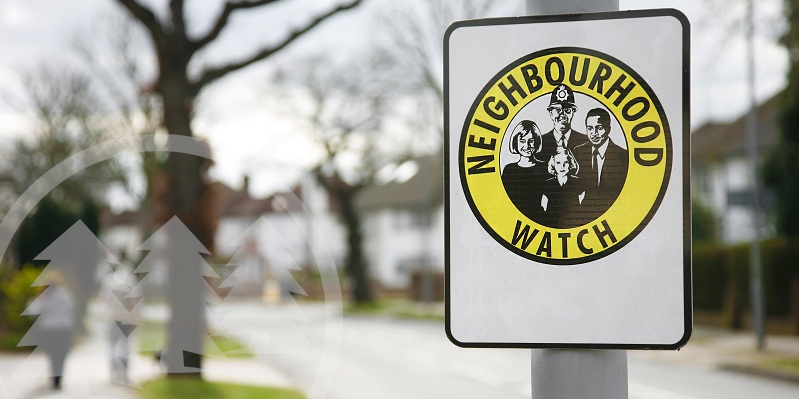Crime is an important concern and a risk in any homeowners association. Incorporating certain trusted systems, such as an HOA neighborhood watch, can ensure that your community stays collectively alert and focused on safety. After all, nobody wants to live in a community where danger is lurking around the corners. Here is why you should consider a resident-run HOA neighborhood watch and how to get started.
The Importance of an HOA Neighborhood Watch
You might have scoffed at the idea of a neighborhood watch patrolling the community streets every night. This kind of program has earned a certain stigma among homeowners. So much so that when they think of a neighborhood watch, they think of grown men playing cops and feeling like they have all the power.
However, an HOA neighborhood watch is far from the joke it has been built up to be over the years. In fact, the benefits of a neighborhood watch are doubtless. The most basic advantage, of course, is that it helps make homeowners feel safe to live within the community. It also forms a sense of camaraderie among community members because they are looking out for one another.
To both deter crime and increase safety, your community should consider setting up an HOA neighborhood watch program. While some may think this type of initiative falls into the HOA board’s hands, it should actually be run by the residents.
How to Set Up an HOA Neighborhood Watch
Starting a homeowners association neighborhood watch can seem like a tall order because you have to begin from scratch. But creating a neighborhood watch program is actually easier than most people think, as long as you follow a few key tips:
1. Work with Law Enforcement
 You must remember that the HOA neighborhood watch is not, by any standard, similar to the police. They do not hold the same power or authority whatsoever.
You must remember that the HOA neighborhood watch is not, by any standard, similar to the police. They do not hold the same power or authority whatsoever.
Should you or any other watch member encounter suspicious or potentially dangerous activity, call the police right away. Do not attempt to diffuse the situation on your own.
Nonetheless, this does not mean your neighborhood watch should keep itself totally separate from local law enforcement. It is definitely good practice to team up with your local police department when setting up your watch group. They will be able to help in providing the proper training and information to the community to ensure your program is effective and successful.
2. Designate “Window Watchers”
 Being a part of the HOA neighborhood watch does not necessarily mean you need to go out and patrol the streets every night. Some people can also help from the comfort of their own homes.
Being a part of the HOA neighborhood watch does not necessarily mean you need to go out and patrol the streets every night. Some people can also help from the comfort of their own homes.
Those who do not leave their home often can be assigned to report any unusual activity they see through their windows.
This is a great way to not only keep an eye out for anything suspicious but to also look out for children in the community as they play outside. The watch program is most effective when there are several attentive pairs of eyes.
3. Have Regular Meetings
 While social media and other forms of communication can be quick and convenient, nothing beats face-to-face discussions.
While social media and other forms of communication can be quick and convenient, nothing beats face-to-face discussions.
Schedule times for all residents to come together, mingle with one another, and work together to build programs in furthering the safety of the community. As they say, there is safety in numbers.
4. Spread the Word
Besides the local sheriff’s office, your community can also work with other local organizations to raise awareness about crime prevention. This will give you more opportunities for the watch program and help increase your involvement in the neighborhood. You can also remind members of the program during community events.
5. Spread Relevant Information
Maintain awareness of crime statistics in your community and stay updated on surveys and police reports. Spreading this information will further help in recruiting neighborhood watch members by helping them understand the importance of the program. People often want to be a part of something significant — something that can make a difference. When they learn of the role the watch group plays within the community, they are more encouraged to join.
Separating the Neighborhood Watch from the HOA
 Because the neighborhood watch operates within the planned development, many automatically think that it should be run by the HOA. This could not be farther from the truth.
Because the neighborhood watch operates within the planned development, many automatically think that it should be run by the HOA. This could not be farther from the truth.
While uniting the HOA and the neighborhood watch program does come with its benefits — such as access to better resources, finances, and achieving faster results — there is a downside to this idea.
If the neighborhood watch is run by and composed of volunteer residents, it is best to keep an unofficial relationship with the HOA. The watch can get embroiled in legal issues, which can inadvertently involve the association if the two are not kept separate.
A good example would be the case of Trayvon Martin, who was shot dead by Twin Lakes HOA neighborhood watch volunteer George Zimmerman back in 2012. Martin’s family sued the Twin Lakes Homeowners Association for wrongful death. The family ended up settling for an undisclosed amount, though they refused the association’s initial offer of $1 million.
While it is best to keep the HOA and the watch group separate, that does not mean you can address the board during meetings. If you feel the community needs additional security cameras or have other safety concerns, you have every right as a member of the HOA to bring up these issues. Your watch group can also choose to hold meetings at community properties, as these should be available for all members to use.
The Final Say
Setting up an HOA neighborhood watch is a great way to get your fellow community members involved and informed about how to recognize crime in your association. While the neighborhood watch program may not be officially part of the HOA, it still remains a viable option for keeping the community safe.
Some volunteers may be tempted to take it upon themselves when they encounter danger. As a civilian, though, you can’t exercise the same authority as police officers. It is important that members understand what to report to the police and do not try to handle all emergency situations themselves. Any activity that is deemed suspicious should be immediately reported to law enforcement.
If your homeowners association is finding difficulty with anything, it is a good idea to contact an HOA management company for help. Should it come to that, please keep us in mind.
RELATED ARTICLES:
- 8 Reasons To Join The HOA Board
- How Should The HOA Deal With Neighbor Harassment
- HOA Political Signs: What’s Allowed?






